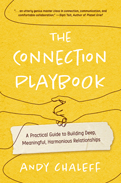
 |
The Connection Playbook: A Practical Guide to Building Deep, Meaningful, Harmonious Relationships
by Andy Chaleff
Meaningful Relations
Though exceedingly meaningful as a relationship manual, Chaleff’s work is far greater. In short, it is a commentary on understanding human behavior at its root level, a sort of cleansing and rewiring of the responses to the inevitable thoughts that inundate the vessel that is the mind. To accomplish this, the author establishes strong rapport and trust within his readers by sharing his own experiences at various stages of the lifespan. By examining nearly all types of relationships, Chaleff delivers a strong understanding of experiential learning and proactively identifies the triggers and the antecedents that lead to particular actions, behaviors, and consequences. Stemming from his own experience with abusive parenting, he provides a compelling roadmap for individuals to manage their own reactions to their thoughts.
Whether it is comparing behavior to the tip of the iceberg—underneath which lie thoughts and triggers—or thoughts being represented as cars on the freeway, hindrances to one’s destination, Chaleff constantly connects with the readers while enlightening them on what is of utmost importance: building a relationship with the “SELF.” He emphasizes that conscious and unconscious thinking, labeling, and coming from a perspective of judgment are just a few ways in which individuals stay stuck and shut down, unable to truly have balance and peace in their lives. At the end of every section, Chaleff takes the content from his work and creates exercises like the “Wizard of Oz Belief Tracer” and the “Shut Down” exercise intended for readers to become more introspective and learn to process their own thoughts better. In every relationship, Chaleff focuses on trust and respect as the pillars that help one come from a position of love rather than judgment and assumption. Overall, universal wisdom exudes from every page of the book, delivered through seamless storytelling that both enlightens and entertains.
RECOMMENDED by the US Review